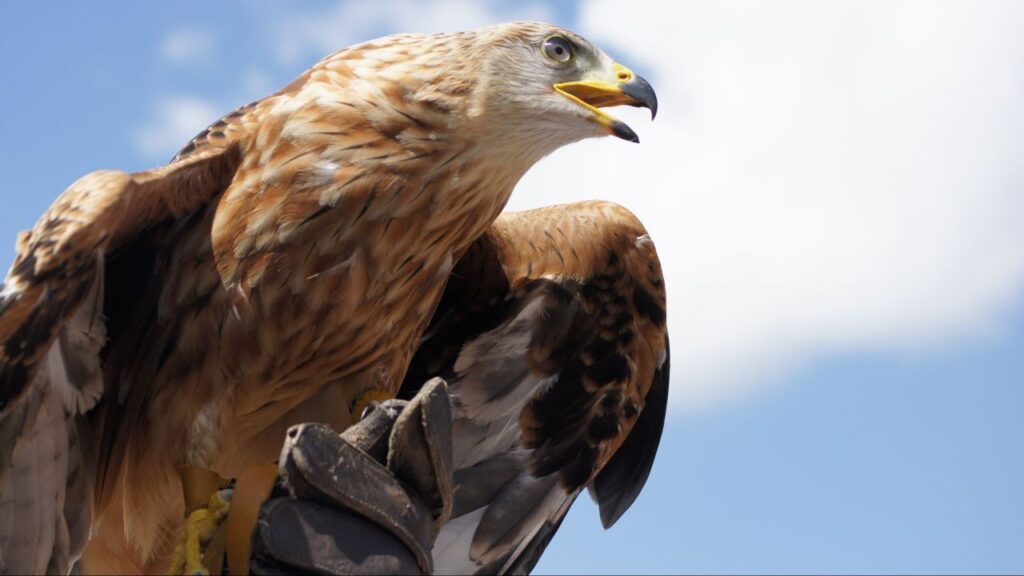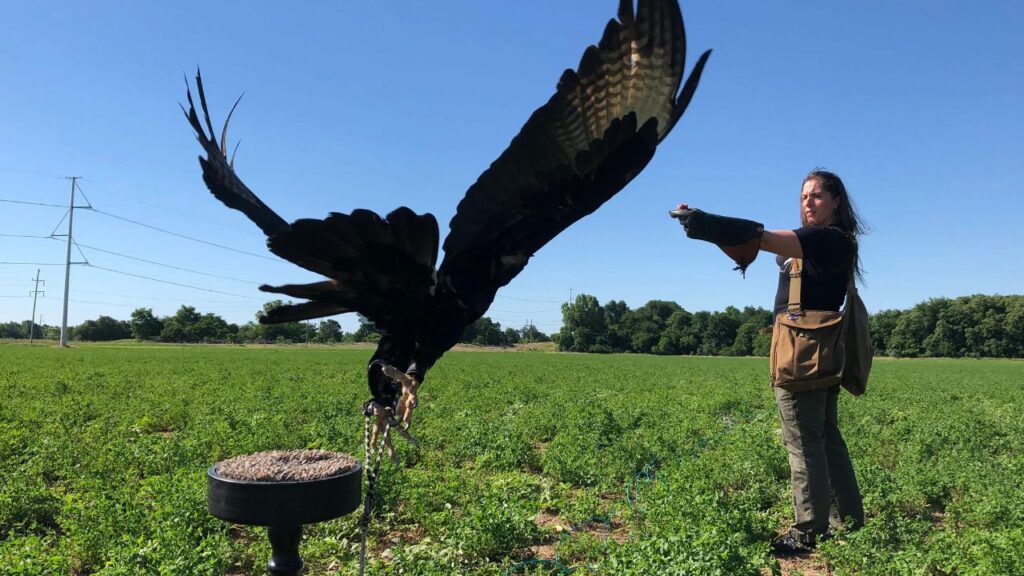Do Eagles Attack Humans? Eagles rarely attack humans unless they feel threatened, particularly when their nests or young are disturbed.
Eagles are majestic creatures that have fascinated humans for centuries. Their powerful presence in the sky, sharp talons, and impressive wingspan evoke a sense of awe and respect.
However, there’s also a common question that piques curiosity and fear: do eagles attack humans?
This article delves into the behavior of eagles, documented incidents of eagle attacks, their potential danger, and ways to prevent such occurrences.
While many might envision eagles as noble symbols of freedom and power, the possibility of these birds turning aggressive towards humans is a topic worth exploring in depth.
Contents
Who Are Eagles?
Eagles are large birds of prey belonging to the family Accipitridae, known for their keen eyesight and powerful flight.
There are over 60 species of eagles, distributed across various continents except Antarctica.
These birds are apex predators, often at the top of their food chain, with a diet primarily consisting of fish, small mammals, and other birds.
Description of Eagles
Eagles are characterized by their large size, heavy heads, and beaks. They have a hooked beak for tearing flesh from their prey, strong muscular legs, and powerful talons.
Their eyesight is exceptionally sharp, allowing them to spot potential prey from great distances. [Do Eagles Attack Humans?]
For instance, the bald eagle, native to North America, can spot fish swimming in the water from hundreds of feet in the air.
The golden eagle, found in the Northern Hemisphere, has talons that can exert a grip pressure of over 400 psi, strong enough to crush bones.
Significance in Culture
Eagles hold significant cultural and symbolic importance across the world. In many cultures, they symbolize power, freedom, and transcendence.
For instance, the bald eagle is a national symbol of the United States, representing strength and freedom.
Native American tribes revere the eagle as a sacred messenger, believed to carry prayers to the Great Spirit. [Do Eagles Attack Humans?]
In Roman mythology, the eagle was the sacred bird of Jupiter and a symbol of the Roman Empire’s military might.
In ancient Greece, eagles were associated with Zeus, the king of the gods, often depicted carrying his thunderbolts. Such cultural reverence underscores the blend of fear and admiration these birds inspire.

Understanding Eagle Behavior
To understand whether eagles attack humans, it’s crucial to first comprehend their typical behavior and triggers for aggression.
Typical Behavior
Eagles are solitary hunters, often seen soaring high in the sky, scanning for prey. Their diet mainly consists of fish, small mammals, and other birds.
They use their powerful talons to snatch up prey and their sharp beaks to tear into the flesh.
Eagles are also known for their territorial behavior, especially during the breeding season when they protect their nests fiercely.
A pair of eagles typically mate for life, and their nests, called eyries, are often reused and added to each year, becoming massive structures over time.
Aggression Triggers
While eagles are generally not aggressive towards humans, there are certain situations where they might exhibit aggressive behavior:
Nesting Season: Eagles become highly territorial during the breeding season. If a human comes too close to their nest, they might perceive it as a threat and act aggressively to protect their young.
This territoriality is particularly evident in species like the bald eagle, which can become very defensive if its nest is approached.
Defensive Behavior: If an eagle feels cornered or threatened, it might attack in self-defense. This is more likely if the eagle is injured or unable to escape.
Their defensive behavior can be quite fierce, utilizing their talons and beaks to fend off perceived threats. [Do Eagles Attack Humans?]
Mistaking Humans for Prey: In rare cases, especially involving small children, eagles might mistake them for prey. However, such incidents are extremely rare and often unintentional.
Eagles, particularly those like the harpy eagle, have been known to prey on animals larger than typical bird prey, such as small deer or monkeys, which can lead to confusion in certain scenarios.
Documented Incidents of Eagle Attacks on Humans
While eagle attacks on humans are rare, there have been some notable incidents that highlight the potential danger these birds can pose.
Rare but Notable Incidents
One of the most famous cases involved a crowned eagle in Ethiopia that reportedly attacked a young child.
Though such incidents are few and far between, they underline the power and potential danger of these birds when provoked.
Another documented case involved a golden eagle attempting to snatch a child at a park in Montreal, Canada.
The eagle misjudged its target and quickly released the child, causing no serious harm. These incidents, while alarming, are exceptions rather than the rule.
In another instance, in Norway, a photographer captured an image of a golden eagle attacking a reindeer calf, showcasing the bird’s capability to handle large prey.
Reasons Behind Attacks
Most attacks occur when eagles feel threatened or are protecting their nests.
Human activities that disturb eagle habitats, such as hiking or climbing near nesting sites, can trigger defensive behavior.
Additionally, young eagles learning to hunt might occasionally mistake small pets or children for prey. [Do Eagles Attack Humans?]
It’s crucial to note that while eagles are powerful, they do not typically see humans as prey and attacks are usually a result of mistaken identity or defensive actions.

How Dangerous Are Eagles?
Understanding the potential for injury from an eagle attack involves examining their physical attributes and comparing their threat level to other birds of prey.
Potential for Injury
Eagles have incredibly strong talons and beaks designed to tear flesh. A golden eagle, for instance, has a grip strength of about 400 psi, which is strong enough to crush bones.
Their talons can cause severe injuries, including deep puncture wounds and lacerations. The beak of an eagle, while primarily used for eating, can also inflict significant damage if used in an attack.
Injuries from an eagle attack can range from minor scratches to severe puncture wounds, depending on the size and species of the eagle involved.
Comparison with Other Birds of Prey
Compared to other birds of prey, eagles are among the most powerful. Harpy eagles, for example, have talons comparable in size to a bear’s claws and can exert tremendous force.
However, birds like hawks and owls can also be dangerous, especially if they feel threatened. Overall, while eagles are formidable, they are generally not aggressive towards humans unless provoked.
Their size and strength make them capable of causing significant harm, but such instances are rare and usually the result of defensive behavior.

Preventing Eagle Attacks
While the likelihood of an eagle attack is low, it’s essential to know how to prevent such occurrences and what to do if confronted by an aggressive eagle.
Safety Tips
Keep a Safe Distance: Avoid approaching eagle nests, especially during the breeding season. Respecting their space is crucial to prevent triggering defensive behavior. It’s recommended to maintain a distance of at least 330 feet from an eagle’s nest.
Do Not Disturb: Avoid actions that might disturb eagles, such as loud noises or sudden movements near their habitat. Activities like flying drones near nesting sites can also provoke aggressive behavior.
Use Protective Gear: If you are in an area known for eagle activity, consider carrying an umbrella or wearing a hat to protect your head and face. This can help deter an eagle from perceiving you as a threat.
Stay Calm: If you encounter an eagle, remain calm and back away slowly. Do not make sudden movements or attempt to provoke the bird. Eagles are more likely to attack if they feel threatened or cornered.
Respecting Wildlife
It’s important to remember that eagles, like all wildlife, play a crucial role in their ecosystems. [Do Eagles Attack Humans?]
Respecting their natural behavior and habitat is key to coexisting peacefully with these magnificent birds.
Observing eagles from a distance and avoiding activities that disrupt their environment can help minimize the risk of aggressive encounters.
Additionally, educating others about the importance of conserving eagle habitats and understanding their behavior can promote safer interactions with these birds.
See Also: Do Owls Attack Humans? The Unexpected Danger!
FAQs
Do eagles attack humans often?
No, eagle attacks on humans are extremely rare. Most eagles avoid human contact and will only become aggressive if they feel threatened or if their nests are disturbed. They are more likely to fly away or avoid humans rather than engage in aggressive behavior.
Why would an eagle attack a human?
Eagles might attack humans if they feel threatened, especially during the breeding season when they are protecting their nests and young. In rare cases, eagles might mistake small children for prey. Defensive behavior is the most common reason for such attacks.
Are eagles capable of killing a human?
While eagles have the strength to cause serious injury, fatal attacks on humans are extremely rare. Their powerful talons and beaks can inflict significant damage, but such incidents are not common. Most injuries from eagle attacks are due to defensive actions rather than predatory intent.
What should I do if I encounter an aggressive eagle?
If you encounter an aggressive eagle, try to protect your head and face with your hands or an object like an umbrella. Back away slowly and avoid making sudden movements. Seek medical attention if injured. It’s important to remain calm and not provoke the bird further.
Can eagles mistake small children for prey?
In rare cases, eagles might mistake small children for prey. These incidents are uncommon, but parents should supervise young children closely in areas known for eagle activity. Ensuring that children do not approach or disturb eagle nests can help prevent such occurrences.
Conclusion: Do Eagles Attack Humans?
Eagle attacks on humans are rare but not impossible. Understanding the behavior and triggers of these majestic birds can help minimize the risk of aggressive encounters.
By respecting their habitat and observing safety precautions, we can coexist peacefully with eagles, appreciating their beauty and significance in our natural world.
Remember, while eagles are powerful predators, they generally avoid human interaction and prefer to live undisturbed in their natural environment.

Hello, I am Rosa Ellis, a mother of two and a wildlife blogger. I grew up in New York City, but I love exploring forests. I’ve traveled to places like Yellowstone National Park and the Amazon Rainforest to see animals up close. I know a lot about animal behavior and which animals can be dangerous to humans. Thanks for visiting my blog!

